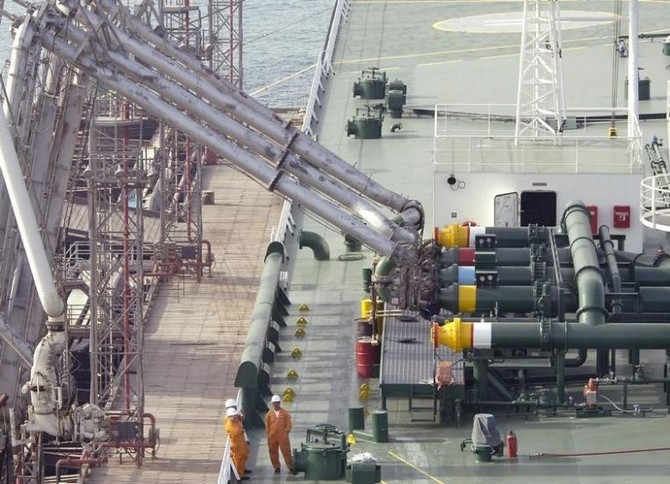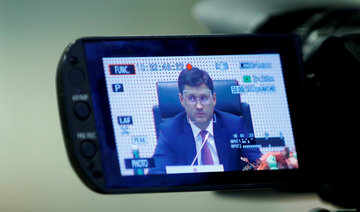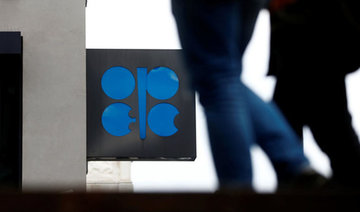SINGAPORE: Kuwait expects to seal new deals to supply Chinese buyers with crude amid healthy demand for its exports in Asia, an oil official from the OPEC Gulf producer told Reuters.
The country also plans to export a new light crude grade by January, as well as spending $120 billion (SR450 billion) over the next five years on expanding both its upstream and downstream businesses, said Waleed Al-Bader, deputy managing director marketing at state-run Kuwait Petroleum Corporation (KPC).
“We see now very healthy refining margins ... this is mainly because of the past months of the OPEC cuts,” Al-Bader said in an interview at the KPC office in Singapore on Wednesday, referring to a push led by Organization of the Petroleum Exporting Countries to curb global crude supply.
“We see medium sour demand is very healthy and we have been approached by several customers for additional cargoes or for new contracts in China.”
The buyers include some small independent Chinese refiners, known as ‘teapots’, said Al-Bader, who was in China last week.
He added that there had been some “firm” enquiries from buyers, mainly for single initial shipments of 2 million barrels, with the potential for discussing term contracts for next year.
Kuwait also plans to start selling a new grade of crude called Kuwait Super Light from January, said Al-Bader. The new light sour grade has an API gravity of 47 and a sulfur content of 1.6 percent, Al-Bader said.
Production of the new grade could reach up to 120,000 barrels per day, he said, but the company is still studying the pricing mechanism for the grade.
The Gulf oil producer’s capital expenditure plan from 2017 until 2022-23 is $120 billion, with most spending planned for its upstream operations, he said.
Kuwait’s output capacity now stands at 3.2 million bpd, with the company aiming to boost that to around 3.3 million bpd by end of the next fiscal year. Kuwait has been pumping around 2.7 million bpd, sticking to it production target under the OPEC supply cut pact, Al-Bader said.
Al-Badr said that he expected OPEC to extend output cuts beyond March 2018, with KPC seeing oil prices in a range of $50-60 a barrel for next year.
Kuwait is also studying establishing a new firm to market refined oil products. The company would help Kuwait sell oil products mainly from its refining joint venture at Duqm in Oman.
“We have got the approvals ... on establishing the company. We have different options and scenarios and we are studying them,” Al-Bader said.
“Hopefully by end of this year, we will have a full report to present ... on how to move forward,” he said, adding that whether the new firm would be a joint venture with another international oil company or trading house, or would be wholly owned by KPC is still being studied.
Kuwait expects to seal new deals to supply oil to Chinese buyers
Kuwait expects to seal new deals to supply oil to Chinese buyers

First EU–Saudi roundtable on critical raw materials reflects shared policy commitment

RIYADH: The EU–Saudi Arabia Business and Investment Dialogue on Advancing Critical Raw Materials Value Chains, held in Riyadh as part of the Future Minerals Forum, brought together senior policymakers, industry leaders, and investors to advance strategic cooperation across critical raw materials value chains.
Organized under a Team Europe approach by the EU–GCC Cooperation on Green Transition Project, in coordination with the EU Delegation to Saudi Arabia, the European Chamber of Commerce in the Kingdom and in close cooperation with FMF, the dialogue provided a high-level platform to explore European actions under the EU Critical Raw Materials Act and ResourceEU alongside the Kingdom’s aspirations for minerals, industrial, and investment priorities.
This is in line with Saudi Vision 2030 and broader regional ambitions across the GCC, MENA, and Africa.
ResourceEU is the EU’s new strategic action plan, launched in late 2025, to secure a reliable supply of critical raw materials like lithium, rare earths, and cobalt, reducing dependency on single suppliers, such as China, by boosting domestic extraction, processing, recycling, stockpiling, and strategic partnerships with resource-rich nations.
The first ever EU–Saudi roundtable on critical raw materials was opened by the bloc’s Ambassador to the Kingdom, Christophe Farnaud, together with Saudi Deputy Minister for Mining Development Turki Al-Babtain, turning policy alignment into concrete cooperation.
Farnaud underlined the central role of international cooperation in the implementation of the EU’s critical raw materials policy framework.
“As the European Union advances the implementation of its Critical Raw Materials policy, international cooperation is indispensable to building secure, diversified, and sustainable value chains. Saudi Arabia is a key partner in this effort. This dialogue reflects our shared commitment to translate policy alignment into concrete business and investment cooperation that supports the green and digital transitions,” said the ambassador.
Discussions focused on strengthening resilient, diversified, and responsible CRM supply chains that are essential to the green and digital transitions.
Participants explored concrete opportunities for EU–Saudi cooperation across the full value chain, including exploration, mining, and processing and refining, as well as recycling, downstream manufacturing, and the mobilization of private investment and sustainable finance, underpinned by high environmental, social, and governance standards.
From the Saudi side, the dialogue was framed as a key contribution to the Kingdom’s industrial transformation and long-term economic diversification agenda under Vision 2030, with a strong focus on responsible resource development and global market integration.
“Developing globally competitive mineral hubs and sustainable value chains is a central pillar of Saudi Vision 2030 and the Kingdom’s industrial transformation. Our engagement with the European Union through this dialogue to strengthen upstream and downstream integration, attract high-quality investment, and advance responsible mining and processing. Enhanced cooperation with the EU, capitalizing on the demand dynamics of the EU Critical Raw Materials Act, will be key to delivering long-term value for both sides,” said Al-Babtain.
Valere Moutarlier, deputy director-general for European industry decarbonization, and directorate-general for the internal market, industry, entrepreneurship and SMEs at European Commission, said the EU Critical Raw Materials Act and ResourceEU provided a clear framework to strengthen Europe’s resilience while deepening its cooperation with international partners.
“Cooperation with Saudi Arabia is essential to advancing secure, sustainable, and diversified critical raw materials value chains. Dialogues such as this play a key role in translating policy ambitions into concrete industrial and investment cooperation,” she added.













